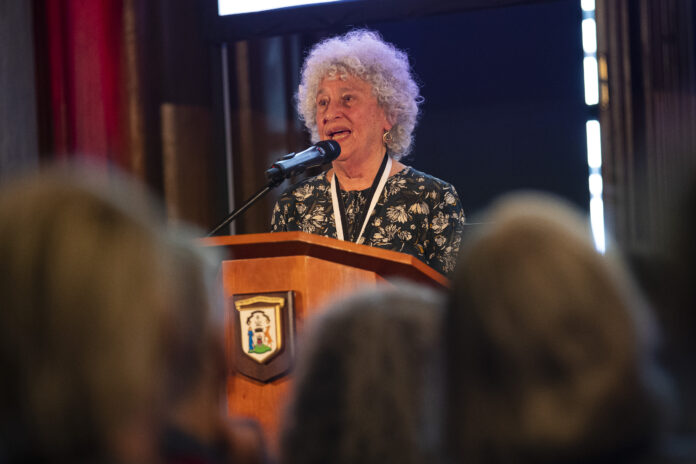How can food be fairer? Food politics expert Prof. Marion Nestle received the prestigious Edinburgh Medal at a ceremony last Wednesday.
Each year, The Edinburgh Medal is presented to those who have made a significant contribution to the well-being and understanding of humanity through the sciences. This year’s recipient is Prof Marion Nestle, a pioneer in the study of food politics, along with wider issues of nutrition and public health.
Food politics explores the wide-reaching implications of what and how we eat – from production and marketing to the possibilities of a fairer distribution of resources. Through her research, advocacy and public engagement work, Prof Nestle has contributed knowledge and inspiration to the field.
An award-winning writer, Prof Nestle is Paulette Goddard Professor of Nutrition, Food Studies, and Public Health, Emerita, at New York University. Alongside her PhD from the University of California, Berkeley, she has been awarded honorary degrees from Transylvania University in Kentucky and the City University of New York’s Macaulay Honors College. Prof Nestle has authored 15 books about food policy and politics. Her memoir, Slow Cooked: An Unexpected Life in Food Politics tracks a fascinating career which has placed the importance of nutrition at its heart.


This year’s oration was delivered by Prof Timothy Lang, Emeritus Professor of Food Policy at the University of London, and the Vote of Thanks by Prof Annie Anderson.
Marion Nestle has written fifteen books about nutrition and food politics and built an unparalleled career at a time when few women worked in the sciences. By the time Nestle obtained her doctorate in molecular biology, she had been married since the age of nineteen, dropped out of college, worked as a lab technician, divorced, and become a stay-at-home mom with two children. And that’s when she got started. Nestle was sixty-six years old when she wrote Food Politics: How the Food Industry Influences Nutrition and Health, the book for which she is most known. She notes that the period since publication has been the most “active, productive, and rewarding years of my academic life.”
Renowned for identifying and examining industry influence, as well as offering clear-headed and scientifically-based nutrition guidance, Marion Nestle has changed the way we think about health, social justice, and scientific responsibility. Her Twitter followers (@marionnestle; numbering over 144K) and readers of her popular Food Politics blog, appreciate her candor and incisive commentary; she fields questions from journalists on a daily basis and lectures worldwide.
“For nearly half a century, I have been teaching and writing about the effects of politics on what we eat and, therefore, on our health. I began my career fascinated by nutrients, every one of them, but I ended up viewing foods, diets, and entire systems of food production and consumption as far more significant. Food companies, as I like to explain, are not social service or public health agencies. They are businesses required by stockholders to prioritize profit above all other values—human, social, and environmental.”
In her memoir, Slow Cooked: An Unexpected Life in Food Politics (Oct), Marion Nestle reflects on overcoming the barriers and biases facing women of her generation – and faced by all women in the academy, and particularly in the sciences – to find her life’s purpose after age fifty. She also explores the role of food in animating intellectual interests and illustrates the personal and professional rewards of value-driven ambition, sheer persistence, and hard work. Slow Cooked tells Marion Nestle’s personal story—one that is deeply relevant to everyone who eats, and anyone who thinks it’s too late to follow a passion.


